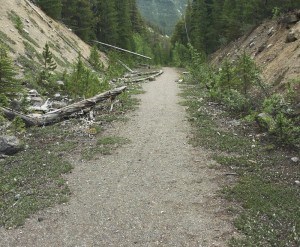
New details emerged this week about plans to build a 107-km bike trail from Jasper to the Columbia Icefields–but not everyone is pleased.
Five environmental groups voiced their opposition to the project citing a lack of public input. The groups also fear a paved trail will damage habitat for endangered species.
“Our main concern really stems from the fact that the $66-million has been allocated for the proposed trail before there has been a full public consultation, including a needs assessment,” said Andrea Johancsik, of the Alberta Wilderness Association.
“This is a significant amount of money and we’re concerned that recent budget announcements have shown more money has been allocated to infrastructure and development than to conservation goals.”
According to Parks Canada, the multi-use trail will run parallel to the Icefields Parkway and make use of areas that have already been disturbed, such as the old paved highway. The hope is that by building a separate trail it will improve cyclists’ safety.
In the summer, the trail will cater to cyclists, hikers and inline skaters and, in the winter, it will be open to cross country skiing, fat biking and snowshoeing.
According to a report by the Canadian Press, asphalt will be required to build the trail, but how much land will be paved is not yet known.
Parks Canada confirmed the trail could eventually stretch all the way to Lake Louise and link up with a current bike trail along the Trans-Canada Highway.
Canadian Parks and Wilderness Society (CPAWS) estimated the amount of paving needed for a trail all the way to Lake Louise would be the equivalent of 116 football fields.
“This bike path flies in the face of the mandate that was given to the minister of environment and climate change to protect the ecological integrity of the park,” said Alison Ronson, executive director of CPAWS for northern Alberta.
She described the proposed trail as the latest example of the commercialization of Canada’s national parks.
“This is just another example of a project that nibbles away at the wilderness in our parks,” said Ronson.
“We would like to see this decision cancelled and the money actually invested in conservation and science monitoring within our parks because that’s where we desperately need it.”
Dubbed the Icefields Trail project, Parks Canada will begin consulting the public, stakeholders and Indigenous groups throughout 2016 and 2017 and undertake a full environmental assessment.
The targeted completion date for the project is March 2019.
“Strict development limits are in place to ensure the protection of ecological integrity in Canada’s national parks. The Icefields Trail will follow Parks Canada’s established processes and rigorous standards for ecological protection, while providing a meaningful experience for visitors,” wrote Steve Young, Jasper National Park’s communications officer.
“It should be noted that the final trail route has not been determined.”
According to Parks, the trail will have no net ecological and cultural impact on the park.
The trail will also avoid steep climbs and descents to ensure its accessible for all skill levels and Parks intends to minimize the number of times it will cross the highway.
In March, the federal budget included $65.9 million in new funding for a biking and walking trail, but was scant on any details.
The surprise announcement caught many people off guard and led to rampant speculation about where the trail would be built.
As details emerged this week about the new trail, environmental groups pushed back arguing the new trail could damage critical habitat for species, such as the endangered Brazeau caribou herd and grizzly bears.
“It’s going against the management plan,” said Jill Seaton, chair of the Jasper Environmental Association. “The management plan talks about the importance of not disturbing and not fragmenting grizzly habitat, but they’re going right through the middle of it.”
Paul Clarke
[email protected]
